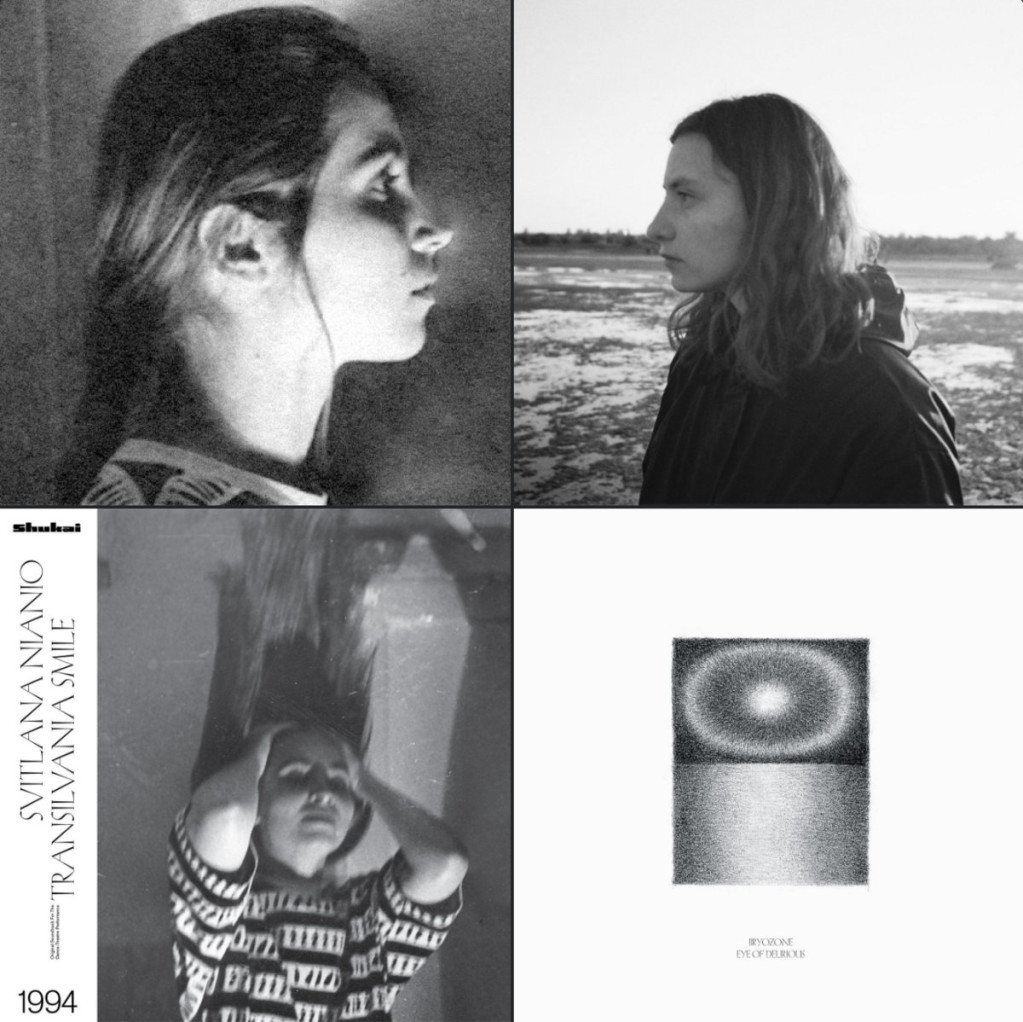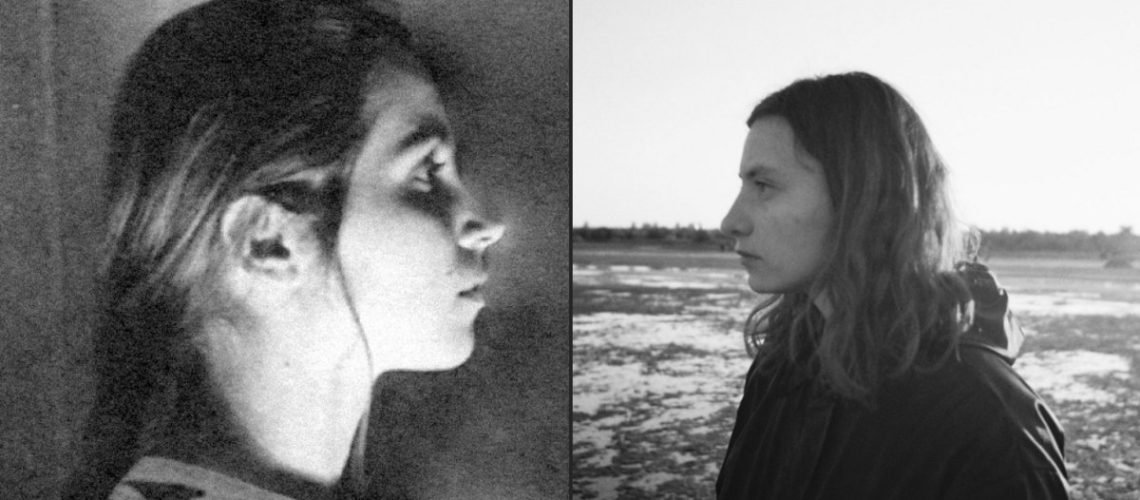There’s a horrible myth that difficult times produce great music – the sort of thing said by people in privileged positions romanticizing crisis. Ukraine’s experimental and leftfield scene deserved more attention long before the full-scale invasion – like so many marginalized scenes. And from the experimental edges of this scene, our friends and colleagues continue producing wonderful sounds that you simply won’t want to miss. Ganna Bryzhata and Svitlana Nianio are here with music across two generations that all ambient and experimental lovers will be happy to enjoy. Here’s to Ukrainian Independence Day – and to the successful end of the war and hope for this scene gathering freely again.
These releases come from two Ukrainian-run imprints (shipping physical from Estonia) – Muscút (Ukr. Мускáт) and its sub-label Shukai.
I say marginalized music, but I’m pleased to report that attention is being paid – that’s thanks to you, music lovers and diggers and fans, even as the music world publicly despairs about press and listeners. You did that. So, if you want this 12″ vinyl – sorry, you’re too late. (Me, too.) But you should still listen to and buy the digital release.

Bryozone
First, the LP debut: it’s Ganna Bryzhata of Odesa, aka Bryozone. (Not “Byrozone” which … implies something altogether different, if fantastic. That’s where all my lost pens are, I guess.)
(Bryozone plays a live AV tomorrow Friday in Berlin Lichtenberg at GISELA, as part of Lange Nacht der Bilde.)
This is gorgeously easy-going music, bobbing gently as if drifting on the Black Sea on a calm day. Blurry loops like “Smoothly Flow” make for what sounds like the ambient classic you’ve never heard, but already know. There are whimsical moments like the cheery detuned machine tune of “Sequence One.” Slowed-down, vaguely west-African rhythms bubble into fuzzy granular delays. Even the spookier, murkier tracks here have an gossamer gentleness to them. It’s top to bottom a wonderful track, with the earnestness of a debut but an ease and focus that sounds like an artist who has fully developed their voice – little wonder, as Bryzhata has been active across projects and actively evolving since her first 2013 EPs.
I read the description last, but I guess I’m not wrong about the sea – I was reminded of the foghorn and chimes a friend had sent from an Odesa field recording, and in fact those elements are woven into the material as field recordings and references.
A slightly better description from the label:
Some artists require a certain measure of distance to thrive. That’s the case for Ukraine’s Ganna Bryzhata, aka Bryozone. She’s best known as the bassist of Chillera, a trio of dub aficionados who developed a gently psychedelic style of space rock in their adopted hometown of Odesa, a port city on the Black Sea. The three once considered moving to Kyiv but ultimately decided that life in the capital wasn’t for them: “It’s great to come for a while, to feel the active movement, but it sucks up the energy,” they told an interviewer in 2019. “You need to be more self-organized to live there. We are still not able to bring this chaos to order.” You can hear that refusal to adapt to the rhythms of the big city in their instrumentals, in which Afrobeat basslines and surf licks churn as blithely as the tide, unconcerned with anything beyond maintaining the breezy vibe.
A similar sense of willful isolation characterizes Bryozone. Bryzhata’s solo music is a world away from Chillera’s, trading their warm blues riffs and wah-wah twang for ethereal loops and icy, atonal drones. But both projects share a timeless quality. Chillera’s records sound like they’ve spent decades gathering mold in some beachside community thrift store; Bryozone’s output might conceivably have been rescued from the flooded basement of a mid-century tape-music studio. Perhaps even more than Chillera, Bryozone is bubble music, promising an insular journey into inner space.
PS, see Nikolaienko, who runs Muscut, too, below.
Svitlana Okhrimenko
Also out on September 1st, there’s a release of Svitlana Okhrimenko’s 1994 solo work “Transilvania Smile.” A haunting, lilting track with fragile, intimate vocals and a warm, wandering organ line, “Episode III” has this same feeling of familiarity and poignancy. You can hear a kind of unintentional thread connecting this and the melancholia of John Object’s “Piano” album, as if the two artists had met the same ghosts on Kyiv’s pianos. While Muscút handles the new releases, Shukai – which means loosely “hunt” or “search” – is retrieving lost tapes from Ukraine’s past decades, and “music for films, television and outsider artists.” You’ll likely see the dancers’ choreography in your imagination, as you close your eyes and listen.
Background:
Svitlana Okhrimenko (artist name: Svitlana Nianio) is a Ukrainian artist, musician, and signer. She is one of the most prominent representatives of the independent music scene of Kyiv in the late 1980s — early 90s. She has repeatedly recorded and performed in collaboration with other musicians and bands, such as Oleksandr Yurchenko, Sugar White Death (Cukor Bila Smert’), Ivanov Down, GeeNerve & Taran, and Blemish. Svitlana still performs and publishes new recordings today.
“Transilvania Smile” is one of the first solo works recorded in 1994. During this time, Svitlana repeatedly visited Germany, where she had the experience of playing in parks and on the streets, gathering contacts of the local art scene. Her cooperation with the international choreographic group Pentamonia, based in Cologne and consisting of several girls who performed in theaters, took part in various performances, and were engaged in music. They met in the 1990s during joint performances with “Sugar-White Death.” After that, they corresponded, and the idea of doing something together arose. Svitlana attended several of their performances, which inspired her to write music for a new project, and the band members helped to realize their creative ideas. Later, they started rehearsing together.
The name “Transilvania Smile” was invented by the project participants, and it symbolized the mold on the mirror and the reflection of a smiling vampire. However, shortly before the premiere, they changed it to “Firefox”, as the participants actively used flashlights and the play of light and shadows in the scenography.
The premiere occurred in the local Urania theater, previously a gallery. Isabel Bartensein directed the choreography, and Svitlana played, sang, and improvised. She said it was an excellent experience for her and the band. Besides Cologne, they also performed in Aachen.
Later, Michael Springer offered Svitlana to record this material in his “Phantom” studio. They had already worked together and recorded music for their project (Svitlana Okhrimenko / Phanton). Michael was also interested in the Ukrainian independent scene and participated in the creation of several compilations that featured bands from Kyiv and Kharkiv. Svetlana played the piano and harmonium in the studio and also sang. After the recording, the material was never released in its entirety. Two compositions appeared on the cassette compilation “Shovaisia” (Hide) in 1995, some episodes were re-recorded for the “Kytytsi” album in 1999, but for a long time, the full version of this recording remained practically unknown to listeners and was kept in Svitlana’s and Michael’s archives.
This album is one of the most personal and insightful works of Svitlana Nianio from the 90s, which you can now get to know in its original form and sound.
As a chaser, here’s Nikolaienko, album boss – now based in Tallinn:
Previously:




